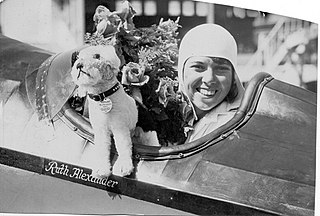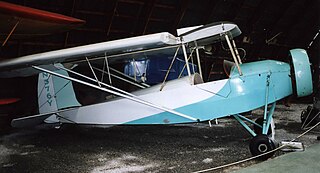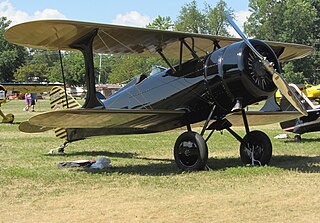
The Wright brothers, Orville Wright and Wilbur Wright, were American aviation pioneers generally credited with inventing, building, and flying the world's first successful airplane. They made the first controlled, sustained flight of an engine-powered, heavier-than-air aircraft with the Wright Flyer on December 17, 1903, four miles (6 km) south of Kitty Hawk, North Carolina, at what is now known as Kill Devil Hills. In 1904 the Wright brothers developed the Wright Flyer II, which made longer-duration flights including the first circle, followed in 1905 by the first truly practical fixed-wing aircraft, the Wright Flyer III.

Marshall is a city in Saline County, Missouri, United States. The population was 13,065 at the 2010 census. It is the county seat of Saline County. The Marshall Micropolitan Statistical Area consists of Saline County. It is home to Missouri Valley College.

The Hughes Aircraft Company was a major American aerospace and defense contractor founded on February 14, 1934 by Howard Hughes in Glendale, California, as a division of Hughes Tool Company. The company produced the Hughes H-4 Hercules aircraft, the atmospheric entry probe carried by the Galileo spacecraft, and the AIM-4 Falcon guided missile.

Robert T. Jones,, was an American aerodynamicist and aeronautical engineer for NACA and later NASA. He was known at NASA as "one of the premier aeronautical engineers of the twentieth century".

The Alexander Aircraft Company was an aircraft manufacturer founded in Colorado in 1925. It was briefly the world's largest aircraft manufacturer but fell victim to the Great Depression and became bankrupt in 1932.

The Mooney International Corporation is an American aircraft manufacturer based in Kerrville, Texas, United States. It manufactures single-engined piston-powered general aviation aircraft.

Ruth Blaney Alexander was an early American female pilot who set several records in altitude and distance in 1929 and 1930.

The Armstrong Siddeley Genet is a five-cylinder, air-cooled, radial engine for aircraft use built in the UK, first run in 1926. It developed 80 hp at 2,200 rpm in its final form and was a popular light aircraft powerplant. Following the company tradition with a slight deviation the engine was named after the Genet, a catlike animal of the same order but different family.

The Historic Aircraft Restoration Museum, located at Creve Coeur Airport in Maryland Heights, Missouri, United States, is dedicated to restoring and preserving historical aircraft. The airplanes in the collection are all fabric-covered, and most are biplanes from the inter-war years. The museum's volunteers maintain most of these aircraft in full working order. This is one of the largest collections of flying classic aircraft in America.

Fairfax Municipal Airport was a Kansas City, Kansas airfield from 1921 that was used during 1935–1949 by the military. Federal land adjacent to the airfield included a WWII B-25 Mitchell plant and modification center and a Military Air Transport terminal. After being used as a Cold War-era Air Force Base, it was used for airliner servicing by TWA and for automobile and jet fighter aircraft production by General Motors, which built a 1985 Fairfax Plant over runways when the municipal airport closed.

The Nicolas-Beazley NB-8G is a United States two-seat parasol wing light monoplane that was constructed in the early 1930s.
Star Air Service, later Star Air Lines and Alaska Star Airlines was an American air service in Alaska from 1932 to 1944. With financial help from a wealthy Alaska miner, three pilots who had started a flying school and charter business in Seattle, shipped an open-cockpit biplane by steamship to Alaska in March 1932. Star Air Service was incorporated in April, 1932 in Anchorage with capitalization of $4,000. The company had some early success training student pilots, but their airplane was destroyed in a crash. Their financial backer helped them purchase a larger plane with an enclosed cabin which supported winter operations.

Boeing Plant 1 was the first airplane production facility of The Boeing Company, serving as its headquarters between 1917 and 1965 in Seattle, Washington, USA. Boeing Plant 1 was used for all aspects of the production of the early Boeing airplane models produced until the completion of Boeing Plant 2 in 1936.

The Nicholas-Beazley Pobjoy Special aka the Nicholas-Beazley Phantom I, aka the Wittman Phantom, aka the Flagg Phantom, aka the Reaver Special was a world record holding air racer of the 1930s.

E. M. Laird Airplane Company was an American aircraft manufacturer of commercial aircraft and custom race planes.

The Menasco Unitwin 2-544 was a coupled piston engine. Menasco Motors Company of Burbank, California was a well known manufacturer of inverted inline four and six cylinder engines. At the request of Lockheed Aircraft designers, Menasco produced an inverted twelve-cylinder air cooled aircraft engine by designing a common crankcase and gearbox for two of the six cylinder engines. The two crankshafts were combined with a unique double clutch gearbox to power a single propeller. This gave reliability of a twin engine aircraft in a single powerplant. It was a success, but did not enter production as no aircraft were produced that used it.

The Nicholas-Beazley NB-3, or Barling NB-3, is a two-seat, training aircraft of the 1920s.
Ole (Olaf) Fahlin was a Swedish aviator who made his career manufacturing propellers and aviation products in the United States. He also developed prototype airplanes and worked in projects with Chrysler and Lockheed Corporation. His propellers were famous for their performance. During World War II he manufactured propellers for the U.S. government.

Wilfred Anthony "Tony" Yackey, Jr., known professionally as W. A. Yackey, was an airplane pioneer of the 1920s. A veteran pilot of World War I, he flew for both the United States and Italian Air Force, and was decorated with the Croix de Guerre by the French government for acts of heroism against the enemy. Returning to the United States, he settled outside of Chicago and operated the Checkerboard Aviation Field in Maywood, Illinois. From this area he would start a flying school, advertised as one of the oldest flying schools in the United States at the time. He would also start the Yackey Aircraft Company, first modifying surplus World War I planes for civilian private and commercial use, and later manufacturing planes of his own design. On October 4, 1927, Tony Yackey died while he was testing one of his planes over the air field when a wing collapsed, causing the plane to crash into the grounds.

















